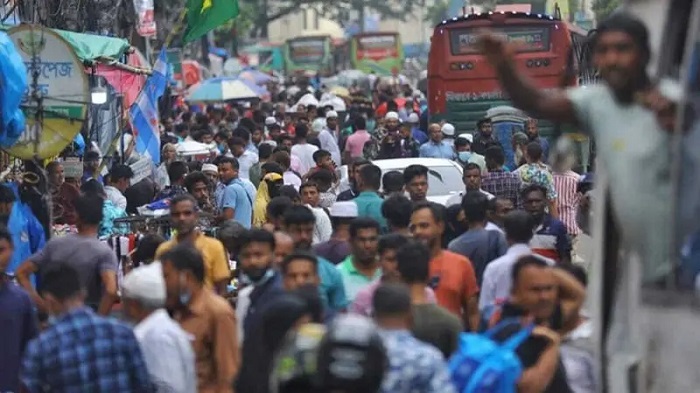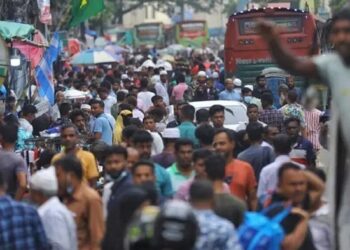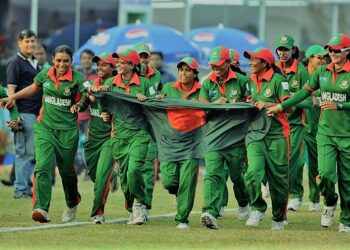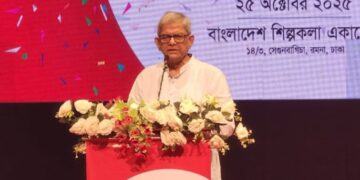Highlights
- Dhaka’s per capita income: $5,163 (nearly double the national average)
- National average income: $2,820 (FY 2024–25)
- Dhaka contributes 46% to national GDP and 40% to exports
- 40% of employment and 32% of urban population are based in Dhaka
- EPI launched to measure economic performance quarterly
- Dhaka’s economy improving after political stabilization
Dhaka district has once again proven its dominance as Bangladesh’s economic powerhouse. According to new data shared at a discussion organized by the Dhaka Chamber of Commerce and Industry (DCCI), the average per capita income of Dhaka residents now stands at $5,163, nearly double the national average of $2,820 for fiscal year 2024–25, as per Bangladesh Bureau of Statistics (BBS) data.
Per Capita Income: Dhaka vs. National Average
The DCCI’s Economic Position Index (EPI) discussion revealed the economic gap between Dhaka and the rest of the country.
- Dhaka’s per capita income: $5,163
- National average per capita income: $2,820
The BBS had reported in May 2025 that the national per capita income reached a record level, increasing by $82 from the previous fiscal year’s $2,738. However, Dhaka’s income level is derived from estimates based on investment, consumption, imports, exports, and population growth, using BBS’s 2011 district-level GDP as the base. Experts present at the event questioned the accuracy of such estimates but acknowledged that the figures reflect Dhaka’s central role in national economic activity.
Read more: Bangladesh Women’s Cricket Likely to Win World Cup Before Men, Says BCB President
Dhaka’s Economic Weight in Bangladesh
DCCI’s Acting Secretary General A.K.M. Asaduzzaman Patwary presented the keynote paper, highlighting Dhaka’s critical economic role:
- 40% of national employment originates in Dhaka district.
- Over 700 companies listed on the stock exchange have headquarters in Dhaka.
- 32% of the country’s urban population and 11.2% of the total population live in Dhaka.
- The district contributes 46% of Bangladesh’s total GDP and over 40% of total exports.
This makes Dhaka not only an industrial hub but also the financial nerve center of Bangladesh.
The Economic Position Index (EPI) Initiative
To reflect the real-time dynamics of the economy, DCCI has launched the Economic Position Index (EPI) — a quarterly economic monitoring system.
The EPI will track industrial and service sector performance across six subsectors: ready-made garments, textiles, wholesale & retail trade, housing, transport & storage, and the banking sector. It aims to provide timely insights for government and private-sector policymakers by identifying changes in economic momentum. DCCI plans to expand the index nationwide in the future.
Why EPI Matters?
DCCI President Taskin Ahmed explained that existing measures such as the Business Confidence Index (BCI), Ease of Doing Business Index, or GDP figures do not capture real-time shifts in business conditions. He emphasized the need for up-to-date and localized data to guide effective policy decisions, saying:
“Traditional methods rely on annual or quarterly national accounts, but in a fast-moving economy, real-time data on investment, employment, and business confidence is essential.”
Findings: Dhaka’s Economy Performing Strongly
Based on data from the last two quarters of 2024, the EPI initially found:
- Dhaka’s economy scored 0.80 on a scale of 0 to 1, indicating a “strong” economic pace for October–December 2024.
- The improvement followed a politically turbulent July–September period, during which economic activity had slowed.
The report credited swift policy decisions by the interim government for helping the economy recover.
Experts’ Opinions
Former DCCI President Abul Kasem Khan remarked that while local indicators show the economy doing well, Bangladesh still ranks low in global comparisons:
“We shouldn’t be complacent with local success. Comparing our indicators to global benchmarks will make them more meaningful.”
Another former DCCI President, Ashraf Ahmed, suggested publishing the EPI monthly and broadening its coverage for better insights.
Other Key Participants
The event was attended by prominent figures from government, academia, and the private sector, including:
- Md. Nurul Alam, DG, National Productivity Organization (NPO)
- Nesar Ahmed, International Trade Expert, Ministry of Commerce •Syed Muntasir Mamun, DG, Ministry of Foreign Affairs
- A.K.M. Atikul Haque, Joint Secretary, Ministry of Finance •Naushad Mostafa and Md. Salim Al Mamun, Directors, Bangladesh Bank
- Prof. Md. Ainul Islam, Jagannath University
- Dr. Md. Din Islam, Assistant Professor, Dhaka University
- Mohammad Jashim Uddin, Research Director, BISS
- Mia Rahmat Ali, Senior Private Sector Specialist, IFC
Source: Prothom Alo



















